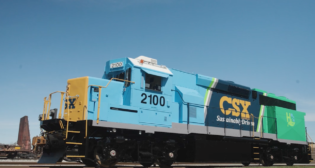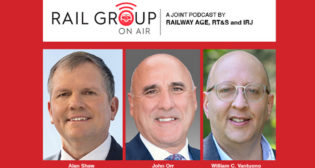
CP, KCS Counter DOJ ‘Concerns’
Written by Marybeth Luczak, Executive Editor
Merger applicants Canadian Pacific (CP) and Kansas City Southern (KCS) are refuting the U.S. Department of Justice’s (DOJ) recent filing with the Surface Transportation Board (STB) questioning use of a voting trust and granting KCS an exemption under merger rules established about 20 years ago.
Among its April 12 filing comments, DOJ (download filing below) wrote: “At this time, the Department does not yet have a view on the merits of the proposed transaction, but the Department submits this comment to urge the Board [STB] to ensure that the parties do not take any action that would undermine the Board’s ability to conduct a meaningful review. Most importantly, as the Department has previously expressed, the Board should rarely, if ever, permit the parties to a proposed merger to use a so-called ‘voting trust’ to effectively consummate an acquisition before the Board has had an opportunity to consider whether the combination would harm competition.”
DOJ also wrote: “More generally, in light of the important issues the Board has raised about the state of competition in the railroad industry, the Board should carefully consider applying its 2001 merger standards and procedures to this case, to ensure it can thoroughly examine the competition concerns raised by commenters … The Board’s 2001 merger rules rightly set a high bar for both proposed transactions and applicants’ use of voting trusts. Although the Board indicated that a merger involving KCS might warrant a waiver from the 2001 rules, the Division respectfully submits that the concerns about voting trusts apply with equal force to this transaction, and thus the Board should protect the integrity of its review process by holding the parties to the same standard before permitting them to proceed with their proposed trust.”
In other words, DOJ is cautioning against STB rubber-stamping the exemption granted KCS in 2001 when new merger rules were established.
An attorney for CP-KCS submitted an STB filing (download filing below) on April 13 that noted the applicants “respectfully submit that DOJ’s comment [filing] does not support revocation of the KCS waiver”; “agree with DOJ that the STB should ‘ensure that the parties do not take any action that would undermine the Board’s ability to conduct a meaningful review’”; and “welcome a meaningful review under the pre-2001 rules.” The attorney also pointed out that “DOJ has not articulated either a factual or a legal basis for its suggestion that Applicants’ [CP and KCS’s] use of a voting trust in this specific circumstance will interfere with that review. To the contrary, use of a voting trust here is essential if there is to be any transaction at all.”
The CP-KCS filing also noted: “As Applicants have already explained, their proposal will fully insulate KCS from control by CP pending Board review and there is no basis for any concern that KCS (with its management intact) could not be readily sold out from under CP control in the unlikely event that proved necessary. See CP-8/KCS-8 at 30. CP and KCS are not arch-rival competitors, unlike GM and Ford (DOJ Comment at 3), and there is thus no realistic concern about either of them pulling their competitive punches while KCS is in trust and insulated from CP influence.
“To the contrary, the proposed voting trust here is unambiguously good for competition: it permits the KCS assets to be acquired by a buyer that has the expertise and incentives to use them effectively in competition with other Class I railroads….”
The CP-KCS filing concluded: “At bottom, then, DOJ’s objection to the use of voting trusts is an indictment of the Board’s broader statutory public interest mandate, under which the Board has the authority to determine for itself whether a specific proposal is in the public interest. In fact, DOJ’s comment does not address the key public interest fact here: without a voting trust, there will be no CP/KCS transaction, and thus no chance at a once-in-a-lifetime injection of new competition into north-south trade flows. CP-8/KCS-8 at 30-31. DOJ’s extensive experience with its HSR-based review of mergers in other industries is inapposite to the realities of this industry: whereas a clearly-procompetitive transaction under DOJ jurisdiction could be cleared within 30-60 days with no need for a voting trust, in the railroad industry even the most procompetitive transaction ever proposed must undergo 12-plus months of regulatory review. That is why, in the face of a competing private equity bid for KCS, CP was compelled to use a plain vanilla trust to carry out this transaction—consistent with the Board’s longstanding precedent. DOJ’s generic concerns should not give the Board any pause regarding the appropriateness of the trust that CP proposes in this case.
“We respectfully urge the Board to decline DOJ’s invitation to require further process beyond that provided for by the robust pre-2001 merger rules.”

Railway Age Editor-in-Chief William C. Vantuono asked CP President and CEO Keith Creel and KCS President and CEO Pat Ottensmeyer (Railway Age’s 2021 and 2020 Railroaders of the Year, respectively) to comment on the use of “voting trusts,” in an interview March 21, following the merger announcement.
Ottensmeyer told Vantuono: “Note that David Starling [former KCS President and CEO and the 2012 Railway Age Railroader of the Year] is the trustee. Dave is supremely independent, had great success as CEO of this company (KCS) for several years. That we have a trustee who served as this company’s CEO during a period where we enjoyed great success is an important factor in showing the STB that we have a structure that preserves its independence and its ability to perform as a separate, standalone entity. This combination brings three of your Railroaders of the Year under one umbrella. An exemption exists because of the environment at the time. There was massive consolidation in the industry and a reflection of the need to handle KCS differently. The two companies here are the two smallest of Class I’s, arguably the two with the best growth profile. When we combine, we will still be the smallest in the industry. A comparison to some of the prior mergers that were done in a different era is one that we hope to avoid. This is a different transaction, a different time.”
Download DOJ Filing:
Download CP-KCS Filing:



